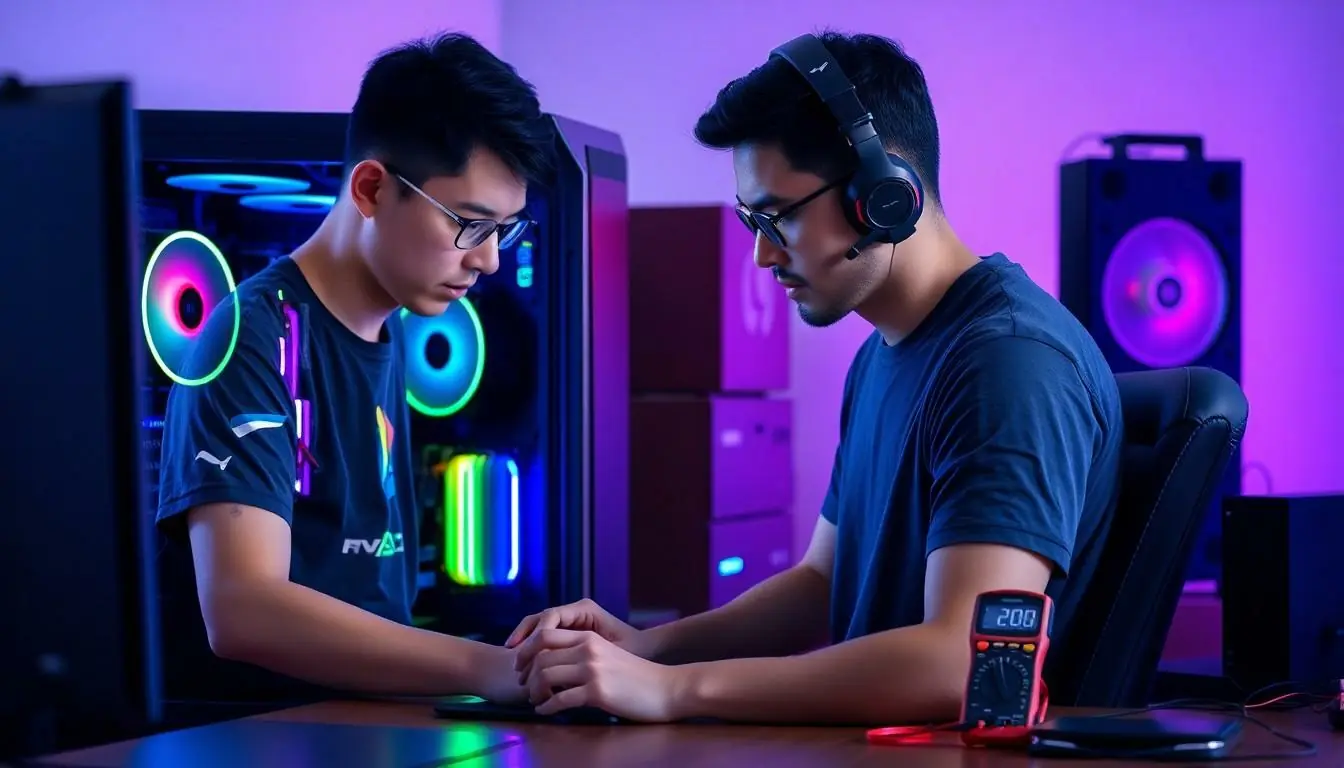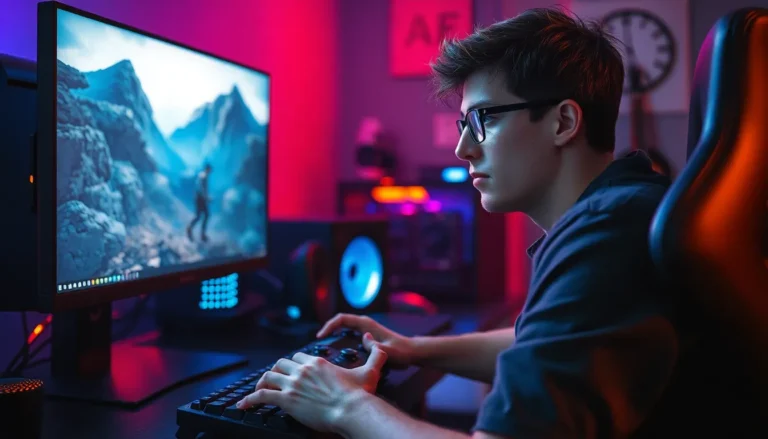Imagine this: you’re deep in an epic boss battle, your heart races, and just as you’re about to deliver the final blow—bam! Your PC restarts. It’s like your computer’s playing a cruel joke, right? For gamers, nothing’s more frustrating than an unexpected reboot, especially when the stakes are high and the snacks are low.
But why does this happen? Is your PC trying to tell you it needs a break or is it just a dramatic plot twist in your gaming saga? Fear not! Understanding the reasons behind those pesky restarts can be the key to reclaiming your gaming throne. Let’s dive into the common culprits that might be sabotaging your gaming experience and how to fix them, so you can get back to conquering virtual worlds without interruption.
Table of Contents
ToggleCommon Causes of PC Restarts While Gaming
Unexpected restarts during gaming often stem from several key issues. Understanding these causes can help pinpoint the underlying problems.
Overheating Issues
Overheating occurs when components like the CPU or GPU generate excessive heat during demanding tasks. This heat can lead to thermal throttling, significantly affecting performance. If internal temperatures reach critical levels, the system automatically restarts to prevent damage. Routine cleaning of dust from fans and ensuring adequate airflow can minimize these risks. Using monitoring software helps track temperature levels. Maintaining proper cooling solutions offers an essential defense against overheating.
Power Supply Problems
Power supply units (PSUs) play a critical role in delivering stable power to components. Insufficient wattage can lead to system instability. If a PSU struggles to meet power demand during intense gaming, it may trigger restarts. Faulty cables or connectors might also cause interruptions. Utilizing a multi-meter can aid in assessing voltage output. Replacing a low-quality power supply with a reliable, higher-wattage unit ensures stability and performance during gaming sessions.
Hardware Failures
Hardware components can fail due to prolonged use, manufacturing defects, or physical damage. Issues with RAM, graphics cards, or motherboards can lead to unexpected restarts. Running diagnostic tests can help identify a failing component. Checking for error codes in the system event log provides further insights. Regularly inspecting hardware connections can also prevent problems. Upgrading aging components provides improved reliability and a better gaming experience.
Troubleshooting Steps
Gamers can follow these troubleshooting steps to identify issues causing unexpected restarts during gaming sessions.
Checking Temperature Levels
Monitoring temperature levels helps ensure components function within safe ranges. Excessive heat from CPUs and GPUs leads to thermal throttling and resets. Use software tools like HWMonitor or MSI Afterburner to track temperatures in real time. If temperatures exceed safe limits, consider improving case airflow, cleaning dust from fans, or applying new thermal paste. Installing additional cooling solutions like case fans or liquid cooling systems improves overall cooling performance. Regular checks on temperature ensure stability during extended gaming sessions.
Testing the Power Supply
Testing the power supply confirms that it delivers adequate and stable power. Gamers should use a multimeter to check voltage outputs from the power supply unit. If readings fall below spec or fluctuate, the power supply may require replacement. Insufficient wattage can lead to system instability. Checking connections ensures that cables are secure and free from damage. Testing with a known, functioning power supply helps identify if the issue lies with the current unit. A reliable power supply is crucial for preventing unexpected restarts during gaming.
Inspecting Hardware Connections
Inspecting hardware connections reveals any loose or faulty links affecting system performance. Loose cables can cause intermittent power issues. Ensuring that all components, including RAM, GPU, and storage devices, are securely seated in their slots promotes system stability. Checking for damage, such as frayed or burnt cables, is equally important. Reseating components might resolve issues caused by poor connections. Regular inspection of hardware connections prevents unexpected interruptions and enhances gaming reliability.
Preventive Measures
Gamers can take several measures to prevent unexpected PC restarts while gaming.
Maintaining Optimal Cooling
Ensuring efficient cooling is essential for stable performance. Heatsinks and fans must work effectively to dissipate heat generated by components. Installing additional case fans can improve airflow within the PC. Monitoring temperature levels using software tools helps identify overheating issues. If temperatures exceed safe limits, consider applying new thermal paste to CPUs and GPUs. Proper cable management prevents obstruction of airflow and encourages better cooling efficiency. Gamers should also clean dust from vents and fans regularly to maintain optimal cooling performance.
Upgrading Components
Upgrading components can significantly enhance system stability. Replacing outdated power supply units with higher wattage options ensures sufficient power delivery. Adding more RAM can help manage resource-intensive games and reduce crashes. Selecting a newer graphics card may provide better performance and cooling solutions. Gamers should evaluate their current hardware and assess where improvements are necessary. If the motherboard has aged components, an upgrade might prevent restarts caused by hardware incompatibilities. Investing in new parts can lead to a smoother gaming experience overall.
Regular System Updates
Keeping the operating system and drivers up to date prevents compatibility issues. Regularly checking for updates reduces the chances of software-related restarts. Installing the latest drivers for graphics cards enhances performance and stability during gaming sessions. Gamers should also update BIOS firmware to ensure hardware communicates effectively. Each update can offer bug fixes or improvements that mitigate system instability. Scheduling these updates can streamline the process and maintain system integrity, allowing uninterrupted gaming enjoyment.
When to Seek Professional Help
Unexpected PC restarts during gaming may signal underlying issues requiring professional expertise. When temperatures consistently exceed safe levels, qualified technicians can evaluate cooling systems. They’ll assess components and airflow to identify potential enhancements.
Persistent power supply problems also warrant expert attention. If stability remains elusive despite troubleshooting, an evaluation of the power system becomes essential. A professional can determine the wattage requirements and inspect connections to ensure reliability.
Hardware failures often emerge as another reason for concern. When unusual noises or performance drops occur, it’s time to consult a specialist. They’ll conduct thorough diagnostics, assessing individual components for defects or wear.
Software issues might also contribute to unexpected restarts. If operating systems or drivers seem problematic despite updates, an IT professional can provide crucial insight. They can analyze logs for error patterns and suggest corrective measures.
In cases where DIY fixes fail, seeking support is imperative. A technician can help prevent further damage to the PC by addressing issues promptly. Professionals often possess specialized tools and knowledge, ensuring efficient problem resolution.
Ignoring signs of trouble can lead to severe consequences. Continuous restarts may cause lasting damage to critical components. Prioritizing professional help protects investments and maintains system performance.
Conclusion
Experiencing unexpected PC restarts during gaming can be a significant disruption. By understanding the underlying causes and implementing preventive measures, gamers can safeguard their systems against these frustrating interruptions. Regular maintenance and monitoring of temperature levels play a crucial role in ensuring optimal performance.
Upgrading components and keeping software up to date can enhance stability and reliability. When issues persist despite these efforts, seeking professional assistance is essential to avoid further complications. Taking proactive steps can lead to a smoother gaming experience, allowing players to focus on what they love most—immersive gameplay.



